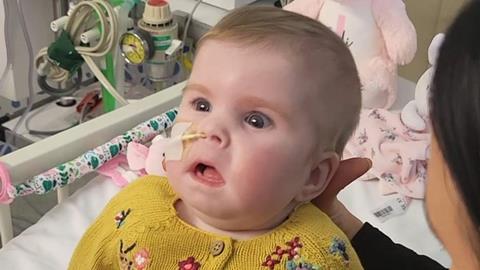Allowing Indi Gregory to die, rather than be moved abroad for treatment reveals serious flaws in the way British courts decide these cases, says Professor David Albert Jones. The law should be changed in order to better recognise the wishes of parents

The case of Indi Gregory is depressingly familiar. We have seen it too many times before.
A severely-ill child is being treated in an NHS hospital in England with a condition that involves brain damage. The doctors have reached a point when they think that the child’s situation cannot be improved. Life could be extended, perhaps by weeks or even months, but death is inevitable and in the meantime, they believe that the treatment is futile and is imposing a burden. The doctors wish to withdraw what they consider to be ‘invasive’ treatment, including ventilation, while maintaining pain relief. It is not clear from what is currently in the public domain whether the less-invasive care plan would involve provision of food and fluids.
Indi’s parents, Dean and Claire, still hope against hope for future improvement. They also believe that, in the meantime, Indi has meaningful interactions with them and is soothed by her hair being stroked by them and that these positive experiences outweigh the occasions of discomfort that Indi may experience when the doctors or nurses need to intervene. They want all life-sustaining treatment to be given.
The NHS Trust took the case to court to allow withdrawal of life-sustaining treatment. In this legal battle the resources of NHS Trusts are vastly greater than those of the parents (in 2021, Nottingham University Hospitals NHS Trust had an annual budget of £1.3 billion, the parents are reliant on legal aid). The parents are faced with a process that is unfamiliar and where it is difficult to get access to medical information about their child. In court the child is represented, not by the parents, but by a guardian. In principle, the guardian could take the same view as the parents but in this case, as in most such cases, the guardian emphasised the burdens of treatment rather than the benefits of life and viewed Indi’s quality-of-life very negatively. The judge, again as in most such cases, sided with the doctors and with the guardian and declared that it would be in Indi’s best interest for ‘invasive’ life-sustaining treatment to be withdrawn.
If doctors in England do not wish to treat the child, why won’t they allow the child to be treated elsewhere?
As Indi would not be able to receive the treatment that the parents thought in her best interests if she stayed in England, the parents asked permission to have Indi transferred to the Bambino Gesu Paediatric Hospital in Rome, which was prepared to accept her. Indi was also granted Italian citizenship.
Transfer for healthcare abroad is difficult in practical terms and financially and it carries risks for a child, but it is sometimes done with the agreement of a hospital. In disputed cases however, the Trust almost always opposes transfer of care. In this case the Trust objected, the case returned to court, and the court refused permission for her to leave.
In response the Italian Consul, acting as Indi’s guardian, made the application under the 1996 Hague Convention on parental responsibility and the protection of children. In a final cruel twist however, the court ruled on 10 November that not only could Indi not travel to Italy but that life-sustaining treatment must be withdrawn and the final withdrawal of treatment and end-of-life care could not occur at the family home. Extubation occurred in a hospice on Sunday 12 November.
It is important to acknowledge that there are limits to what medicine can achieve and sometimes we need to recognise this and withdraw treatment that is causing harm for limited benefit. It is also true that sometimes parents make medical decisions on behalf of their children that are harmful, and that ultimately the courts may need to step in. Until parents are shown to be making decisions that are both unreasonable and harmful however, they must be recognised as the first judges of what is in the best interests of their children. To take this responsibility away from parents peremptorily is an injustice not only to them but also to children who have the right to be cared for by their parents. In particular, as a patient has a right to seek medical treatment abroad, so parents should have the right to seek treatment for their child where those offering the treatment are properly qualified and properly regulated.
For people outside the United Kingdom, it seems scandalous that parents are prevented from taking their child to a recognised hospital within the European Union, where the standard of healthcare is certainly equivalent to the NHS in the United Kingdom. If doctors in England do not wish to treat the child, why do they not at least allow the child to be treated by a properly qualified medical team in another country? This agonising outcome is the result of the way that decisions are made in NHS Trusts and is also due to flaws in the way that the courts decide such questions.
To address this issue properly would require a fundamental change in the culture within NHS Trusts and a change in the law properly to recognise the authority of parents as judges in the first instance of what is in the best interests of their child. Nevertheless, the situation could be improved significantly if the Health and Care Act 2022 were simply amended to reintroduce the amendment proposed by Baroness Ilora Finlay and supported by a majority of peers. That amendment was a modest change, informed by a palliative care perspective, that sought only to prevent Trusts from going to court without having explored less burdensome options. Going to court is very costly not only financially but also on a human level.
This whole process has added greatly and unnecessarily to the suffering of Indi’s parents and has not shown English healthcare or English law in a good light. If any good could come of this terribly sad case it would be to revisit that much needed amendment to the law.
The staff of the Anscombe Bioethics Centre wish to express our solidarity with Indi, with her parents and all her family as they go through this deeply painful time and assure them of our prayers for Indi in this life and in the life of the world to come.



































3 Readers' comments